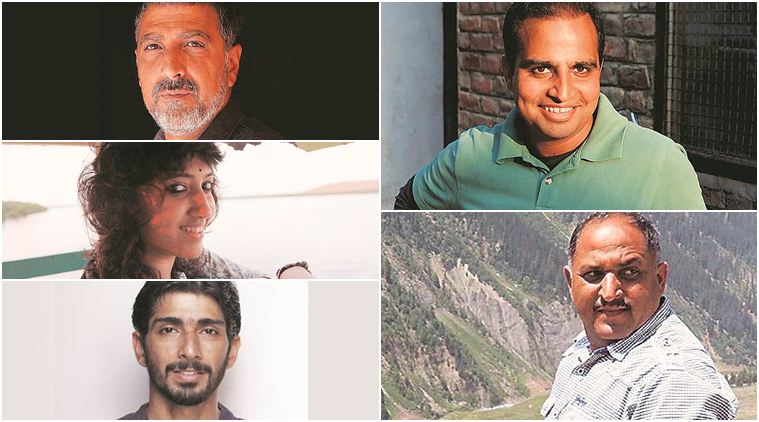 Mukhtar Khan, Dar Yasin and Channi Anand won the award in the Feature category; Anushree Fadnavis and Adnan Abidi won in Breaking News Photography category. (Express Photo)
Mukhtar Khan, Dar Yasin and Channi Anand won the award in the Feature category; Anushree Fadnavis and Adnan Abidi won in Breaking News Photography category. (Express Photo)
Written by J S Rajput
Three Indian photojournalists from Jammu and Kashmir won the Pulitzer Prize this month. They have been honoured for feature photography. The photographs, as have been published in the media after the awards, apparently capture the “sufferings” of the people of J&K consequent to the changes in certain temporary provisions in Article 370 of the Constitution of India.
These photographs have gladdened the hearts of those who openly disfavoured Union government action on Article 370 that led to the final integration of the state with India. It was a long-awaited action that was pending for over seven decades. The common man appreciated it, felt a greater affinity with this most beloved, beautiful part of India. Expectedly, Pakistan was infuriated, and so were certain elements within the country. Western media went the distance and condemned it. Their interest in photo-features that can be projected worldwide as depicting the brutal atrocities of the government of India is well understood: The citation for these awards is clear proof of the existence of this strong anti-India lobby. It clearly indicates that the action of the Indian government was illegal, that inhuman atrocities were committed on the people of Kashmir, and that J&K is not a part of India.
The normal expectation is that any national and international recognition should bring cheer to every Indian. The kind of submission that is made to the award-giving agency is the prerogative of the aspirants. In the present case, the way references have been made by the award givers to J&K declares the action of the Union government illegal. They have no business to do so. If these awards are accepted, it can’t be without asking the organisation to redo its citation. Otherwise, someone like me would feel deeply hurt. I am inclined to make a personal recollection as a recipient of a prestigious international award.
In May 2004, the UPA government had just taken over. The NCERT was being ferociously “de-saffronised”: At the top on the hit-list was Professor J S Rajput who was the director of the NCERT during July 1999-July 13, 2004. In August 2004, the UNESCO selected Rajput for awarding the prestigious Jan Amos Comenius Medal for “Outstanding Achievements in fields of Educational Research and Innovations”. He and his wife were invited to receive the award in Geneva, and then be the state guests of the government of Czechoslovakia for a week. Professor Rajput was to also address around 144 ministers of education in a plenary session on “value inculcation” at the invitation of the International Bureau of Education in Geneva. The award was approved by the director-general of UNESCO, based on the recommendations of an international jury. In an act of unprecedented vendetta, the GoI wrote to UNESCO to defer the award as Professor Rajput had “violated certain fundamental values enshrined in the Constitution of India”! Rajput was informed by UNESCO that such a thing had never occurred in their history. They deferred the award, with considerable reluctance, but continued to associate with Rajput on several occasions: It continues even today.
Incidentally, all of the major recommendations made for school education reforms — for which Rajput was responsible — were approved by the three-judge bench of the Supreme Court of India in its judgment of September 12, 2002 (Aruna Roy vs Union of India). These included teaching the basics of all religions, having in place one’s mother tongue as the medium of instruction, values education, the teaching of Sanskrit and Vedic mathematics. To justify the denial of a prestigious international award to an Indian academician, the GoI did its best for five years by trying to implicate Rajput in one way or another. But they failed. The issue was then taken to the High Court of Delhi where the eminent jurist L M Singwi appeared, gratis, on six occasions, to get justice for Professor Rajput. The High Court imposed a fine of Rs 2,000 on the GoI. Finally, Rajput got his Award in 2009 at a function held in the UNESCO House in New Delhi. UNESCO wanted to hold the function in the MHRD in the presence of the minister at the time — but Kapil Sibal could not stomach it, and refused to even provide the conference room facility. There was one bright spot though. The then joint secretary dealing with UNESCO in the MHRD attended the award function despite his minister asking him to not do so.
I am indeed happy that the present government has not reacted adversely to the Pulitzer awards incident — I find it graceful. The award citation, in this case, is not prepared by the award winners. So, I would be willing to congratulate them if they request the Pulitzer Award Committee to not cast any aspersions on the unity and integrity of India and modify the citation accordingly.
The writer is former director NCERT and works in the education space